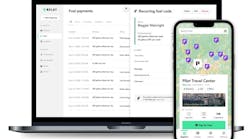Rinker Materials, a leading producer of construction materials in the state of Florida since 1926, has found it profitable to haul aggregate using 100% owner-operators. The success of the program, according to Jeff Bailey, South Florida terminal manager, is attributed to consistent and fair dispatching, combined with strict driver qualifications and maintenance requirements for owner-operated equipment.
The transportation division of Rinker, established in 1990 to haul aggregate from the company's numerous quarries to its concrete products and ready-mix plants within the state, currently has under lease 700 owner-operators. “We started out solely as a dump truck fleet,” Bailey says, “but have expanded to include cement tankers and a flatbed division, which goes under the name New Line Transport.
“Power equipment,” Bailey adds, “is split fifty-fifty between tri-axle straight trucks and tractors. The only restriction we place on the owner-operators as far as equipment goes is that it meets our strict fleet safety requirements. All drivers must have regularly scheduled inspections and maintenance done on their trucks, with reports submitted to us.
“For the dump trailers, we prefer the O-O's use shorter Florida-spec'd dump units because they are easier to maneuver in tight spaces, as well as aluminum dump beds so they can haul more product. Also, we will not accept frameless trailers because of the danger they pose in tipping during dumping operations.”
Bailey says a major improvement recently made in the transportation division is in the way Rinker trucks are dispatched. “We have moved from manual scheduling and dispatching to using alphanumeric pagers, cutting the process down from four to five hours to less than two. Drivers love the system because they can retrieve all the details of their next-day's work schedule from anywhere they happen to be.
While Rinker Materials has expanded its operations to include manufacturing facilities in 32 states, a good portion of the business is still within Florida, including 15 quarries, 65 ready-mix plants, and 33 building materials distribution centers.
ON OPPOSITE SHORES
For Granite Rock Co., a large producer and distributor of aggregate products in central-coastal California, balancing equipment to be able to meet periods of top demand without having trucks sit idle during slower times of the year is one of the company's biggest challenges.
Carey Wong, transportation division manager, says: “Ideally, we'd like to have 100 trucks on hand to be ready for any situation. But when business is slower in the winter we may only need 20 to 30 trucks. The trick is finding the optimum equipment inventory level for best customer service, while maintaining a cost-effective operation.”
Granite Rock Co.'s transportation services division is located in Aromas, CA, which is also the site of the company's main quarry. Here a fleet of 50 delivery trucks are maintained, 20 of which are company-owned, the remainder owned and operated by independent contractors. Deliveries are made to customers as far south as Monterey, CA, and north to San Francisco.
A unique feature found at the Aromas quarry is an automatic load-out system, which Wong says is similar to a bank's ATM system. The system enables customers equipped with special radio-frequency ID tags to pick up loads 24/7 without an attendant being present.
Granite Rock has several asphalt and concrete batch plants, as well as a construction division, so a big part of the transportation division's responsibility is to serve these internal customers. The trailer fleet consists of bottom and semi-end dumps, transfer units, pneumatic cement trailers, and oil tankers for transporting hot asphalt oil to batch plants. The tractor fleet is made up entirely of Peterbilt 379s spec'd with lightweight Caterpillar C-12 engines.


